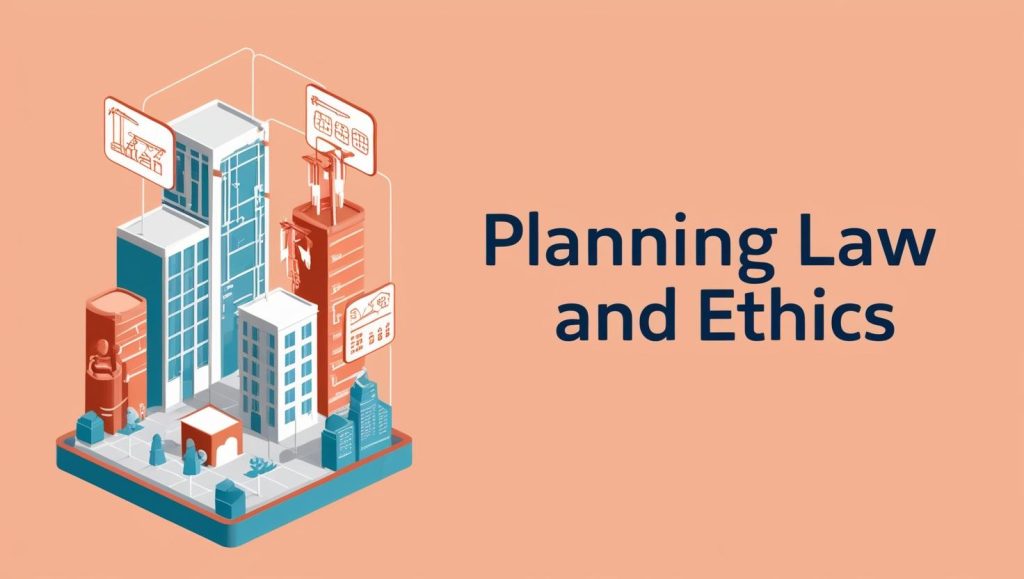Planning law and ethics play a critical role in urban development, land use, and sustainable growth. Students studying planning law must understand complex regulations, legal frameworks, and ethical considerations that govern spatial planning, environmental policies, and zoning laws. This article provides a comprehensive Planning Law and Ethics Homework Help, covering essential concepts, key legal principles, ethical dilemmas, and expert guidance.

What is Planning Law and Ethics?
Planning law refers to the body of legal rules that regulate land use, development, and environmental protection. Ethical considerations in planning focus on fairness, sustainability, and the balance between private interests and public welfare. These aspects ensure that urban development aligns with long-term community needs and environmental sustainability.
Importance of Planning Law and Ethics
Understanding planning law and ethics is crucial for urban planners, policymakers, and legal professionals. It helps:
- Ensure legal compliance in land use and zoning
- Protect environmental and cultural heritage
- Balance economic growth with social responsibility
- Promote fair housing and accessibility
- Prevent corruption and conflicts of interest
For further reading on planning law and ethics, visit authoritative resources such as the American Planning Association (APA) or the Royal Town Planning Institute (RTPI).
Key Aspects of Planning Law
1. Zoning Regulations
Zoning laws dictate how land can be used in different areas, including residential, commercial, industrial, and mixed-use zones.
2. Environmental Protection Laws
Regulations ensure sustainable development by controlling pollution, conserving natural resources, and protecting wildlife habitats.
3. Land Use Policies
Governments set policies to manage urban expansion, rural preservation, and transportation planning.
4. Property Rights and Eminent Domain
Governments can acquire private land for public use under eminent domain laws, but they must provide fair compensation.
5. Building and Safety Codes
Legal requirements ensure that structures meet safety, accessibility, and health standards.
For more information on zoning laws and urban policies, visit Urban Land Institute.
Ethical Considerations in Planning
Ethical dilemmas in planning arise when balancing competing interests. Some key ethical principles include:
1. Public Interest vs. Private Gain
Urban planners must prioritize community well-being over personal or corporate profits.
2. Social Justice and Equity
Planning should promote fair access to resources, affordable housing, and inclusive urban spaces.
3. Environmental Stewardship
Sustainable planning ensures minimal environmental impact and promotes green infrastructure.
4. Transparency and Accountability
Planners must maintain ethical standards by avoiding corruption, bribery, and conflicts of interest.
For insights into ethical challenges in planning, explore The Ethics and Public Policy Center.
Challenges in Planning Law and Ethics
Despite its importance, planning law and ethics face several challenges:
- Conflicts between development goals and conservation efforts
- Political and corporate influence in urban planning decisions
- Lack of community participation in planning processes
- Displacement of marginalized communities due to gentrification
For discussions on urban ethics and policy-making, visit The Lincoln Institute of Land Policy.
How to Get Planning Law and Ethics Homework Help
Many students struggle with planning law assignments due to the complexity of legal terminology and ethical debates. Here are some effective ways to get Planning Law and Ethics Homework Help:
1. Online Tutoring Services
Several platforms offer expert guidance in planning law, including:
- Chegg
- Tutor.com
- Khan Academy
2. Academic Journals and Books
Referencing credible academic sources enhances the quality of assignments. Some valuable resources include:
- Planning and Control of Land Development by Daniel R. Mandelker
- The Ethics of Urban Design by Gideon Golany
3. University Resources
Many universities provide online libraries, discussion forums, and study groups where students can collaborate and seek assistance with planning law.
4. Professional Organizations
Joining planning organizations, such as the American Planning Association (APA) and the Royal Town Planning Institute (RTPI), provides access to research papers, industry insights, and networking opportunities.
Conclusion
Planning law and ethics are vital components of urban development and land use regulation. For students studying this field, understanding key legal principles and seeking Planning Law and Ethics Homework Help from reliable sources can significantly improve academic performance. Whether through online tutoring, professional organizations, or university resources, ample support is available to help students master planning law and ethical considerations.


